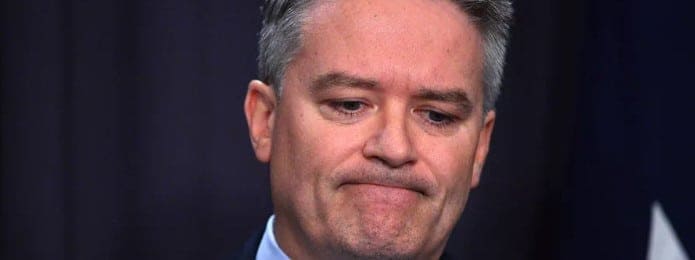The government has pulled its legislation for tax cuts for big businesses – for the second time this year – after its last minute bid to get the Senate crossbench numbers failed.
Announcing the retreat, Finance Minister Mathias Cormann, who had been running the negotiations, reaffirmed that the government remained committed to the cuts, and cast the July 28 byelections as a referendum on them.
Cormann was unable to win Pauline Hanson’s two votes or the two senators from the Centre Alliance.
After flip-flops and with the byelection in Longman at the forefront of her mind, Hanson stuck with her rejection of the measure. The Centre Alliance’s opposition was reinforced by the fact that its lower house member, Rebekha Sharkie, is fighting for survival in the Mayo byelection.
The government had flagged that it intended to press the matter to a vote this week but then decided it did not want to be rebuffed on the floor or parliament.
Cormann told a news conference: “We need more time to make our argument to our colleagues on the
Senate crossbench – and we, of course, will continue to make our argument in the Australian community.”
“The government remains fully committed to these business tax cuts for all businesses because it is the right thing to do for working families around Australia.”
This is the second blow on the tax front for the business community this week.
On Tuesday, in what’s been labelled a “captain’s call”, Opposition Leader Bill Shorten announced a Labor government would repeal legislated tax cuts for businesses with turnovers between $2 million and $10 million. Business has reacted angrily to the repeal plan.
The ALP is still considering its position for those with turnovers from $2 million to $10 million. It is under pressure to clarify its policy quickly.
Cormann said the byelections “will be a referendum on who has the better plan for a stronger economy and more jobs”.
In a reference to speculation about the Labor leadership in the event of bad byelection results, Cormann said, “After the byelections, who knows? We might have a more business-friendly Labor leader. All sorts of things could
be different on the other side of the byelections.”
He said his message to the people of Longman and Braddon was that they “do have the opportunity to send Bill Shorten and Labor a message. If they don’t like Bill Shorten’s higher taxes on business, on hardworking Australians, on retirees, on home owners, on everyone who moves, then vote against Labor, put Labor last.”
Cormann also targeted One Nation voters. He pointed to polling showing two thirds of One Nation voters in Longman supported lower business tax.
![]() “I hope that the fact that One Nation voters increasingly appear to be coming on board with our plan for lower business taxes will, over time, help to persuade Senator Hanson this is the right thing to do.”
“I hope that the fact that One Nation voters increasingly appear to be coming on board with our plan for lower business taxes will, over time, help to persuade Senator Hanson this is the right thing to do.”
__________________________________________________
By Michelle Grattan, Professorial Fellow, University of Canberra
This article was originally published on The Conversation. Read the original article.
TOP IMAGE: Finance Minister Mathias Cormann: We. need more time to make our argument to our colleagues on the. Senate crossbench. (Mick Tsikas/AAP/The Conversation)












